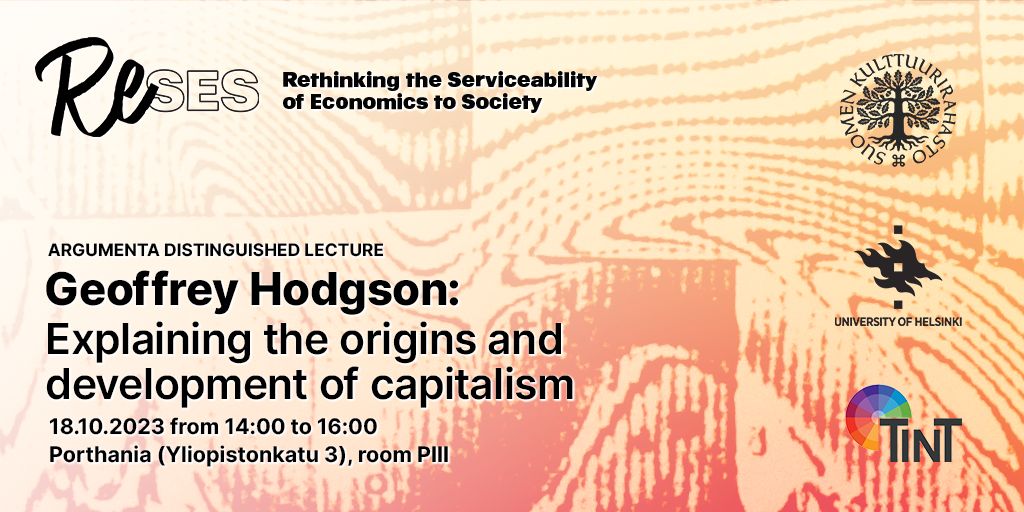
Yksi uuden institutionaalisen taloustieteen näkyvimmistä edustajista saapuu Helsinkiin keskiviikkona 18.10. Professori Hodgson kertoo, miten taloustieteiden avulla voidaan ymmärtää kapitalismin syntyhistoriaa. Yleisökysymysosuuden avaa professori Jari Eloranta. Tervetuloa!
Geoffrey Hodgson / Argumenta Distinguished Lecture
Time: 18th October 2023, 14:00-16:00
Place: Porthania (Yliopistonkatu 3), PIII
Title: Explaining the origins and development of capitalism: The importance of historically specific institutions and exogenous shocks
We will also stream the event if you can not come to Porthania:
Zoom link
In this ReSES Argumenta Distinguished Lecture, Professor Hodgson will explore and compare the available explanations of the origins and development of capitalism. The lecture will provide a new perspective on the history of capitalism and simultaneously shed light on the ability of economics to explain the origins and development of capitalism.
Although many scholars agree that modern capitalism emerged in England in the eighteenth century and led to The Industrial Revolution, they are still debating how and why. Some argue that it is the technological change while others point to the Protestant ethic, liberal ideas, and cultural change. In his new book, The Wealth of a Nation, Professor Geoffrey Hodgson reveals the crucial developments in legal and financial institutions in the seventeenth and eighteenth centuries that help to explain this dramatic transformation.
One prominent explanation of the development of capitalism in England emphasises the crucial importance of exogenous shocks such as the Glorious Revolution of 1688 that changed political and religious landscape of England. In a famous article, written in 1989, Douglass North and Barry Weingast study the evolution of the constitutional arrangements in seventeenth-century England following the Glorious Revolution of 1688 and argue that the new institutions of the Glorious Revolution allowed the government to commit credibly to upholding property rights, and successfully so. In his lecture, Professor Hodgson will argue that, although the Glorious Revolution was important factor, the North-Thomas argument misses some important issues.
This ReSES Argumenta lecture will offer a new perspective on the early history of capitalism and show how intensive military conflicts overseas forced the state to undertake major financial, administrative, legal, and political reforms. Professor Hodgson will illustrate the importance of the reforms to mortgage law that preceded Glorious Revolution and the Financial Revolution of 1660-1720. He will argue that these were crucial in providing financial supports for industrialists and coincided with the beginnings of the Industrial Revolution. He will also explain how the institutional innovations that radically transformed the British economy were copied and adapted by countries around the world.
Shedding light on the early history of capitalism, Professor Hodgson will provide the audience with the essential knowledge that helps understanding the importance of institutional factors in the development of capitalism, and also provide the much-needed perspective to interpret and understand the state of capitalism today.


